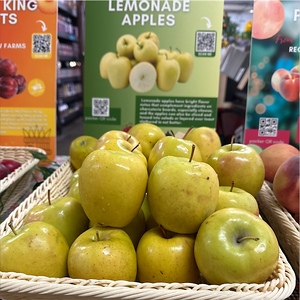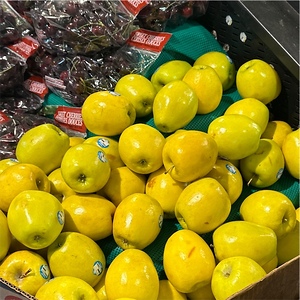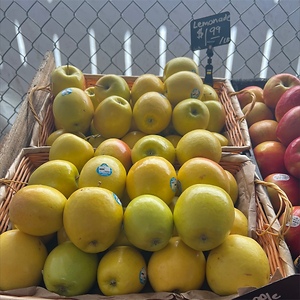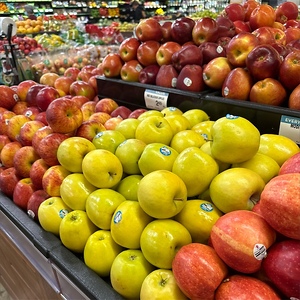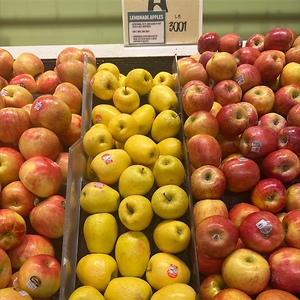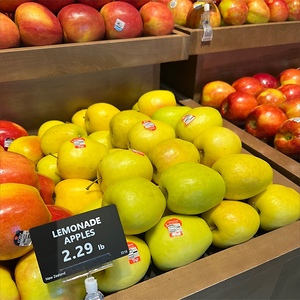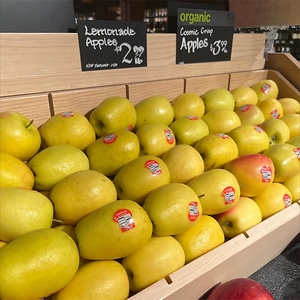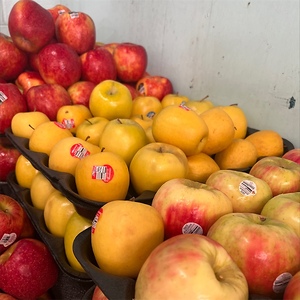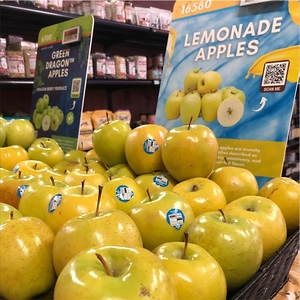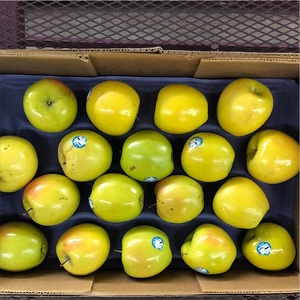

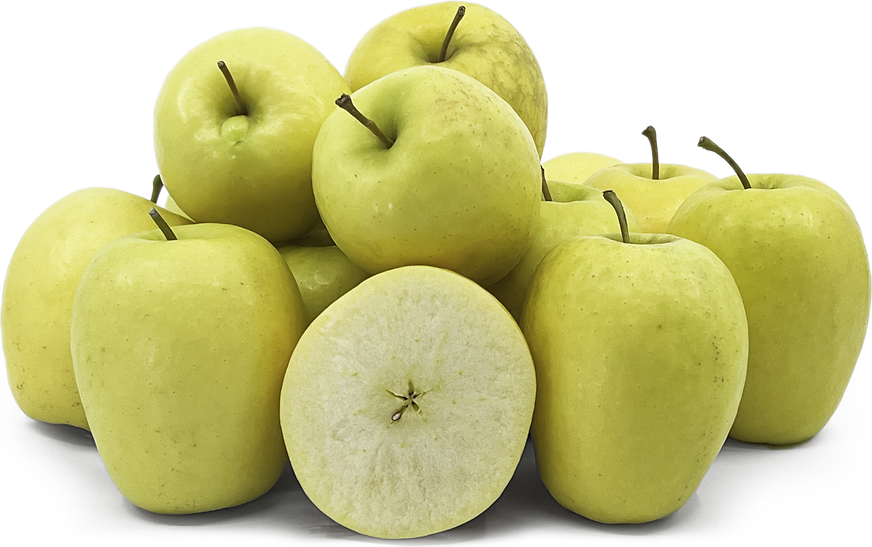
Lemonade Apples
Estimated Inventory, lb : 40.86
This item was last sold on : 07/25/25
Description/Taste
Lemonade apples are a medium to large varietal and have an elongated, conical, oblong shape with flat, broad shoulders tapering to a narrow base. The variety often has a shape similar to its parent, Braeburn apples, and the dark brown stems are slender, fibrous, and woody. The skin ripens from green to shades of pale to golden yellow and has a smooth, glossy, and taut appearance with a few faint lenticels scattered across the surface. The skin is also thin, easily bruised and damaged, and develops faint patches of pink-orange blush when exposed to extended periods of sunlight during cultivation. Underneath the surface, the pale-yellow flesh is dense, firm, moderately fine-grained, and aqueous with a chewy, crisp, and breaking consistency. When the flesh is bitten, the juice bursts into the mouth, sometimes developing a subtle, effervescent, fizzy consistency. Lemonade apples release a sweet, floral aroma and have a bright, refreshing, balanced, sweet-tart taste with faint floral and fruity nuances. The apples are edible raw or cooked, and their sweet flavor notes are from their Gala parent, and their tartness is from their Braeburn parent.
Seasons/Availability
Lemonade apples are available in the late spring through early winter, as they are grown in both hemispheres and exported to create an extended season. In each hemisphere, the variety has a peak season in the fall and winter.
Current Facts
Lemonade apples, botanically classified as Malus domestica, are a New Zealand variety belonging to the Rosaceae family. The golden-hued apples were developed from a natural cross and were released as a new commercial variety in the early 21st century. Lemonade apples are named for their golden, lemon-hued skin and bright, sweet-tart taste. The variety is often said to evoke the freshness associated with summer, connecting the apples with the popular citrus summer beverage. Lemonade apples are a specialty variety that is only commercially produced in limited quantities through exclusive suppliers in North America and New Zealand. Consumers favor the variety for its juicy, crunchy nature, sweet-tart taste, and vibrant coloring. Lemonade apples are primarily consumed as a dessert or fresh-eating variety, but the apples are also versatile and are sometimes used in various sweet or savory cooked preparations.
Nutritional Value
Lemonade apples have not been studied for their nutritional properties. Like other yellow apples, the variety is a source of potassium to balance fluid levels within the body, fiber to regulate the digestive tract, and vitamin C to boost the immune system. Yellow apples also provide small amounts of copper to develop connective tissues, magnesium to control optimal nerve functioning, calcium to build strong bones and teeth, vitamin E to protect the cells against the damage caused by free radicals, and other nutrients, including zinc, vitamin K, manganese, and iron.
Applications
Lemonade apples have a balanced, sweet-tart taste suited for fresh and cooked preparations. The variety is popularly consumed out of hand and is savored for its refreshing, juicy nature. Lemonade apples have bright flavor notes that complement ingredients on charcuterie boards, especially cheese, and the apples can also be sliced and tossed into salads or layered over toast slathered in nut butter. Try adding Lemonade apples to sandwiches, incorporating slices into fresh spring rolls, or combining them into slaws for texture. The apples can also be used in hummus or gazpacho as an unexpected ingredient, chopped over crostini, or served as a snack with dips. In addition to fresh preparations, Lemonade apples can be mixed into rice and grain-based dishes, topped over flatbreads and pizza, or simmered into sauces for roasted meats. They can also be cooked into jams and other preserves, baked into cakes, crumbles, donuts, tarts, muffins, and cookies, or used in recipes calling for sweet-tart apples. Beyond culinary dishes, Lemonade apples can be juiced and added to mocktails, cocktails, sangria, and smoothies. Lemonade apples pair well with nuts such as almonds, walnuts, and pine, whole grain mustard, spices such as cinnamon, ginger, and nutmeg, herbs including basil, mint, and cilantro, carrots, Brussels sprouts, tomatoes, chickpeas, clementines, cucumbers, and lemon. Whole, unwashed Lemonade apples should be immediately consumed for the best quality and flavor. The apples will also keep for several weeks when stored in the refrigerator's crisper drawer.
Ethnic/Cultural Info
Lemonade apples are primarily grown in Hawke’s Bay, New Zealand, by the Yummy Fruit Co. Hawke’s Bay is known for its nutrient-dense soil, flat sheltered plains, ample sunlight, and moderate climate, often referred to as the “fruit bowl” of New Zealand. The Yummy Fruit Co. was established by the Paynter family, who began their lineage on a homestead over five generations ago by John Paynter. Paynter traveled the world searching for apple varieties, and over time, his homestead expanded into a company with over 700 hectares of apple and stone fruit orchards. Lemonade apples are packed at their on-site packhouse and are shipped throughout New Zealand as a fresh-eating, specialty fruit.
Geography/History
Lemonade apples are native to New Zealand. The variety was developed from a natural cross between Braeburn apples and Gala apples in the early 21st century. It is said that the Lemonade apple’s yellow coloring stems from its Golden Delicious grandparent, one of the parent varieties of Gala apples. Lemonade apples were selectively evaluated and bred for several years before officially being marketed to the public in New Zealand in 2009. The Yummy Fruit Co. has exclusive rights to Lemonade apples in New Zealand. The variety was also introduced to the United States through exports in the early 2000s. In the United States, Giumarra Co. has been importing Lemonade apples from New Zealand during the summer and has exclusive rights as the variety’s American supplier. Giumarra Co. has also partnered with a few American growers to cultivate the variety for fall and winter crops. These partnerships began releasing locally grown Lemonade apples in the United States in the fall and winter of 2022. Today, Lemonade apples are still produced in the Hawke’s Bay Region of New Zealand. They are also grown in Washington State and are expanding production to the Eastern United States. When in season, Lemonade apples are sold through select specialty distributors and retailers.
Featured Restaurants
Restaurants currently purchasing this product as an ingredient for their menu.
| Vertex - Merryfield Row | San Diego CA | 619-405-8950 |
| Fort Oak | San Diego CA | 619-795-6901 |
Recipe Ideas
Recipes that include Lemonade Apples. One



